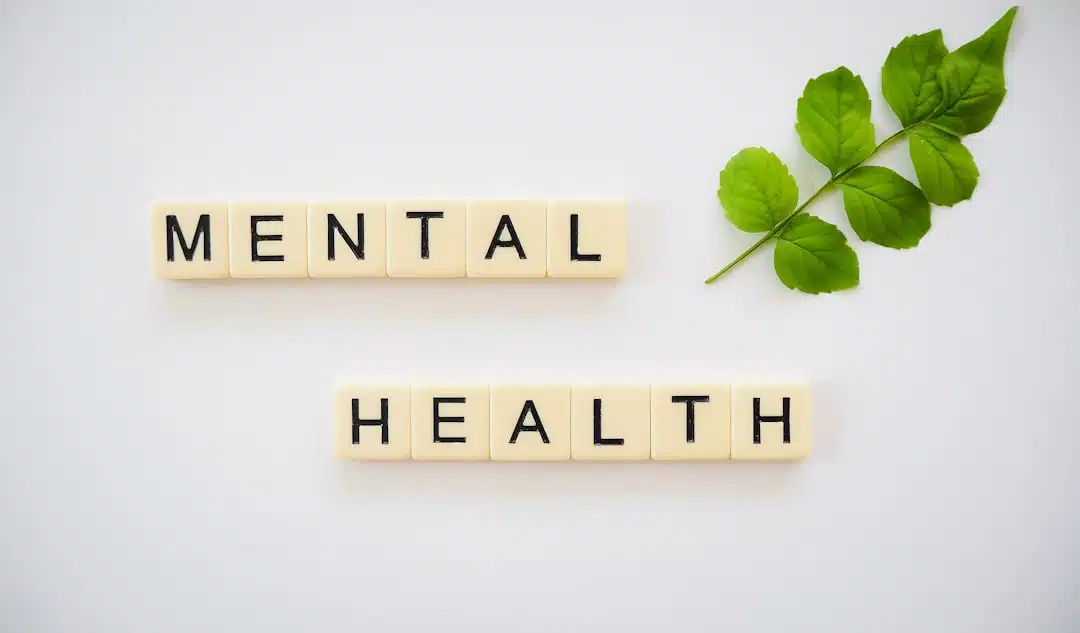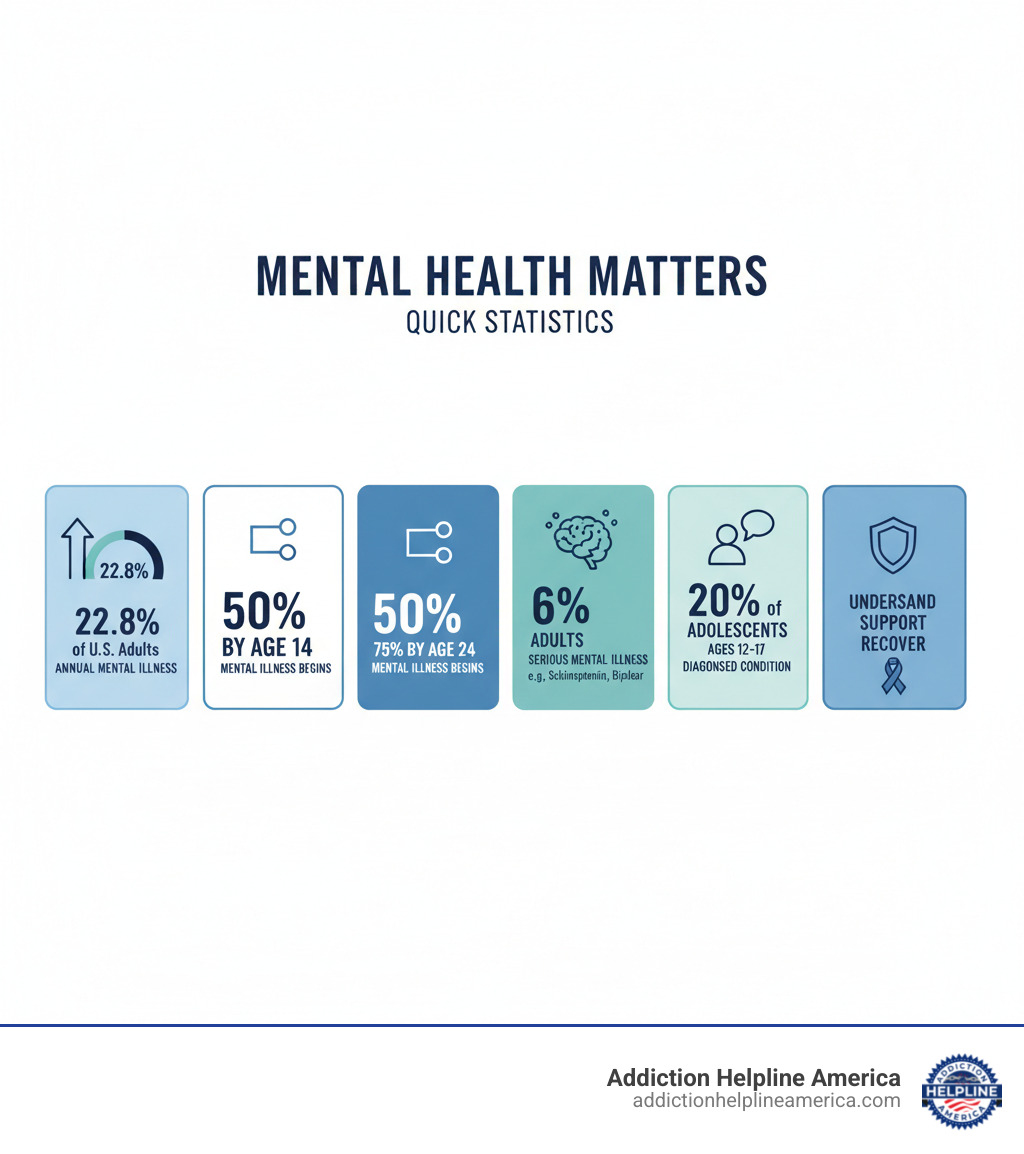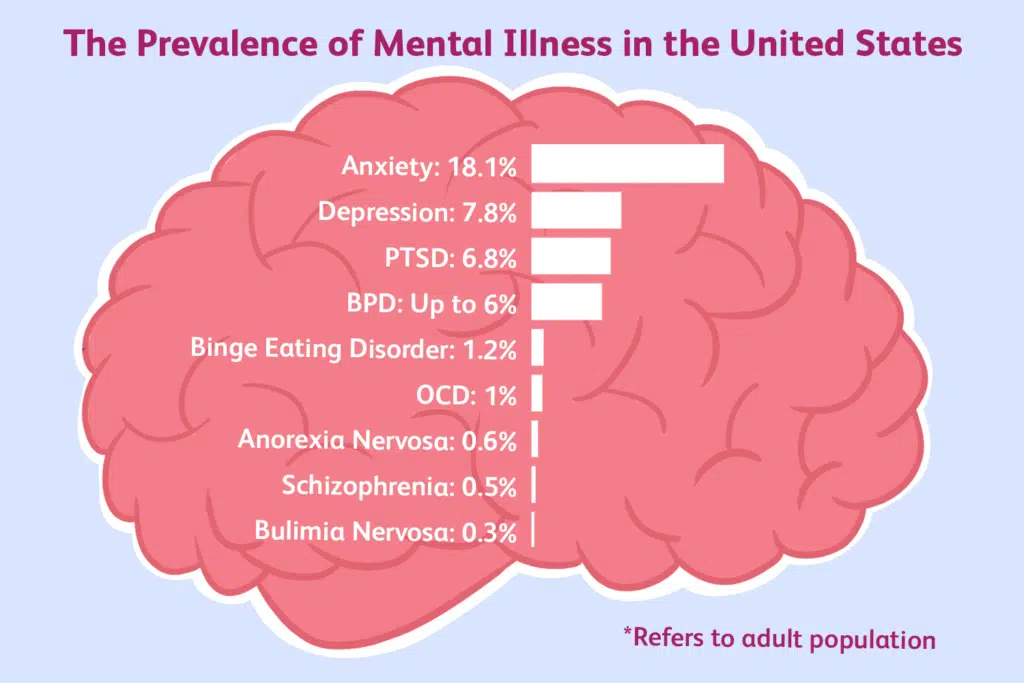
Why Mental Health Matters for Everyone
Mental health is our emotional, psychological, and social well-being. It influences how we think, feel, and act, affecting our ability to handle stress, relate to others, and make choices throughout our lives.
Quick Facts About Mental Health:
- Prevalence: More than 1 in 5 U.S. adults (22.8%) experience a mental illness each year.
- Early Onset: 50% of all lifetime mental illnesses begin by age 14, and 75% by age 24.
- Treatment Gap: Over half (54%) of adults with mental health disorders receive no treatment.
- Co-Occurring Disorders: 33.5% of U.S. adults with mental illness also had a substance use disorder in 2021.
Mental health isn’t just the absence of illness; it exists on a continuum from flourishing to struggling. The World Health Organization defines it as “a state of mental well-being that enables people to cope with the stresses of life, realize their abilities, learn and work well, and contribute to their community.”
Understanding mental health is the first step toward healing. Mental and physical health are equally important—depression increases the risk for diabetes, heart disease, and stroke, while chronic physical conditions can trigger mental health challenges.
At Addiction Helpline America, we support individuals and families affected by both mental health challenges and addiction. Our 24/7 helpline connects you with treatment options and the guidance you need to take the first step toward recovery.

Simple mental health word guide:
Understanding Common Mental Health Conditions
Mental health conditions are medical conditionsjust like diabetes or heart diseasethat affect how we think, feel, and steer daily life. They are not character flaws but diagnosable, treatable conditions that millions experience. Healthcare professionals use standardized tools like the DSM-5 and ICD-11 to identify these conditions and determine the best way to help.

Here are some of the most common mental health conditions:
- Anxiety disorders (affecting 19.1% of U.S. adults annually) involve persistent, overwhelming worry, restlessness, and trouble concentrating.
- Depressive disorders (affecting 8.3% of U.S. adults annually) bring prolonged hopelessness, loss of interest in once-enjoyed activities, and persistent fatigue.
- Trauma-related disorders like PTSD (affecting 3.6% of U.S. adults annually) can develop after a traumatic event, causing flashbacks, nightmares, and severe anxiety.
- Bipolar disorder (affecting 4.4% of U.S. adults in their lifetime) involves dramatic mood swings from manic highs to depressive lows that impact daily functioning.
- Psychotic disorders like schizophrenia distort a person’s perception of reality, causing hallucinations and delusions. It is a leading cause of disability worldwide.
- Personality disorders (affecting 9.1% of U.S. adults) involve inflexible patterns of thinking and behaving that cause significant distress in relationships and daily life.
- Eating disorders (affecting 9% of Americans in their lifetime) are serious conditions involving severe disturbances in eating behaviors and distressing thoughts about body image. If you need support, eating disorder help is available.
- Neurodevelopmental disorders like ADHD and Autism Spectrum Disorder (ASD) often begin in childhood and impact social interaction, communication, and attention.
The Link Between Substance Use and Mental Health
Mental health conditions and substance use disorders often occur together, a condition known as co-occurring disorders or dual diagnosis. In the past year, 20.4 million U.S. adults experienced both. Many people turn to alcohol or drugs to self-medicate symptoms of anxiety, depression, or trauma, seeking temporary relief. However, this creates a vicious cycle where substance use worsens the underlying mental health condition and interferes with effective treatment. Both conditions often share risk factors like genetics and trauma, which is why integrated treatment addressing both simultaneously is crucial for lasting recovery. For more detailed information on co-occurring disorders from Addiction Helpline America, we offer comprehensive resources.
Call Now – Your Journey to Recovery Begins Today!

Take the first step towards a healthier life! Call now to connect with our compassionate team and start your recovery journey today. Your path to healing awaits!
Our recovery specialists are available 24/7 to provide support, and all calls are confidential and free. Reach out anytime – we’re here to help!
Societal Factors Impacting Mental Well-being
Your mental health is shaped by the world around you. Factors like trauma and violence, especially in childhood, are major risks for developing mental health conditions. Homelessness creates immense psychological trauma and stress. Poverty and economic inequality are chronic stressors linked to higher rates of mental health disorders. Discrimination based on race, gender, or sexual orientation also damages mental health. Finally, social determinants of healthsuch as access to safe housing, quality healthcare, and stable employmentare fundamental to protecting mental well-being. When these needs aren’t met, communities become more vulnerable. For more info about our resources, explore our website to see how we can support your journey.
Pathways to Treatment and Crisis Support
Taking the first step toward mental health support can feel overwhelming, but you don’t have to do it alone. Understanding the path from recognition to treatment makes a significant difference.

The journey often starts with recognizing that something feels wrongpersistent sadness, overwhelming anxiety, or turning to substances to cope. Self-assessment tools, like the free, anonymous screenings from Mental Health America, can be a helpful starting point. While not a diagnosis, they can indicate if professional support is a good next step. You can Take a mental health test through our resources.
A professional evaluation with a qualified provider is the next crucial step. They will conduct a thorough assessment to understand your unique experience. From there, treatment planning becomes a collaborative conversation between you and your provider to set goals and determine the best approach for your needs.
Types of Mental Health Support
Effective support comes in many forms, and you have options.
- Therapy and counseling (or “talk therapy”) is a powerful tool for exploring thoughts, feelings, and behaviors. Approaches like Cognitive Behavioral Therapy (CBT) and Dialectical Behavior Therapy (DBT) help build coping skills.
- Support groups provide connection and a safe space to share your story with others who understand.
- Medication, prescribed by a medical professional, can be a game-changer for many conditions by helping to balance brain chemistry. It is often most effective when combined with therapy.
- Addiction specialists are critical for treating co-occurring disorders, providing integrated care that addresses both mental health and substance use simultaneously.
- Holistic approaches address the whole person through physical activity, expressive therapies (art, music), mindfulness, and self-compassion practices.
| Treatment Type | Focus | Benefits | Considerations |
|---|---|---|---|
| Therapy | Addressing thoughts, emotions, behaviors, and coping skills | Long-term coping strategies, self-awareness, emotional processing, relationship improvement | Requires commitment, finding the right therapist, may not address severe biological factors |
| Medication | Balancing brain chemistry to reduce symptoms | Symptom reduction, improved mood, increased energy, stabilization of severe conditions | Side effects, ongoing monitoring, not a standalone solution for all, prescribed by a provider |
| Peer Support | Shared experiences, mutual understanding, non-professional guidance | Reduced isolation, validation, practical advice, sense of community | Not professional treatment, may vary in structure and effectiveness |
Finding the Right Mental Health Support
Navigating the care system can feel complex, but it can be simplified. Start by talking to your primary care physician, who can offer initial guidance and referrals. When you’re ready to find a provider, resources like SAMHSA’s treatment locators or our team at Addiction Helpline America can connect you with programs that fit your needs. The Mental Health Parity and Addiction Equity Act requires most insurance plans to cover mental health care, and we can help you verify your insurance. Community health centers also offer affordable services. Our confidential guidance can help you Find treatment with Addiction Helpline America across all 50 states.
Call Now – Your Journey to Recovery Begins Today!

Take the first step towards a healthier life! Call now to connect with our compassionate team and start your recovery journey today. Your path to healing awaits!
Our recovery specialists are available 24/7 to provide support, and all calls are confidential and free. Reach out anytime – we’re here to help!
Resources for a Mental Health Crisis
A mental health crisis requires immediate attention. Warning signs of suicide include talking about wanting to die, feeling hopeless or trapped, withdrawing from others, and increasing substance use. If you or someone you know is in crisis, help is available right now.
- Call or text 988 to reach the Suicide & Crisis Lifeline for free, confidential support 24/7.
- In immediate danger, call 911 or go to the nearest emergency room.
- You can also Contact Addiction Helpline America for immediate support. Our team is here to connect you with crisis-appropriate care.
Fostering Resilience and a Supportive Future
Building a future where everyone can thrive requires a proactive approach to mental health, focusing on prevention, early intervention, and strong community support.

Prevention is about creating conditions where positive mental health can flourish. Since half of all lifetime cases start by age 14, early intervention for children and adolescents is critical. Prevention strategies work by reducing risk factors (like poverty and discrimination) and promoting protective factors (like strong social connections and coping skills). Even workplaces can promote mental health through supportive policies to prevent burnout.
Community support systems are the backbone of accessible care. When communities invest in local mental health centers and integrate services into general healthcare, help becomes more available. Organizations like Mental Health America provide essential local resources, advocacy, and peer support across the country.
Coping Strategies for Individuals and Families
Developing effective coping strategies is essential for maintaining good mental health. Building resilienceour ability to bounce back from adversityis a skill you can develop. Key practices include:
- Self-care: Prioritize healthy habits like a balanced diet, adequate sleep, and regular exercise.
- Stress management: Use techniques like deep breathing, spending time in nature, or engaging in hobbies to reset and recharge.
- Family communication: Open, non-judgmental conversations create a safety net and help everyone feel less alone. Our Resources for families from Addiction Helpline America offer practical guidance.
- Setting boundaries: Protecting your energy by establishing healthy boundaries in relationships and with commitments is essential for preventing burnout.
Reducing the Stigma of Mental Illness
The stigma surrounding mental illness is a major barrier to seeking help. It can appear as public disapproval, discrimination, or self-stigma. We can combat this in several ways:
- Language matters: Use person-first language (e.g., “a person with schizophrenia” instead of “a schizophrenic”) to see the individual, not the diagnosis.
- Education: Public education programs are changing hearts and minds by increasing awareness and challenging taboos.
- Sharing personal stories: When individuals share their mental health journeys, it normalizes these struggles and builds empathy.
- Advocacy: Organizations like NAMI and Mental Health America work for policies that reduce stigma and improve access to care. For More info about our mission, visit our dedicated page.
The Future of Mental Health Research
The field of mental health is constantly evolving. The National Institute of Mental Health (NIMH) is at the forefront of advancing our understanding of the brain and the biological basis of mental health conditions. This research is leading to improved, personalized treatments. Innovations in care like telehealth and digital tools are making support more accessible than ever. The future is moving away from a one-size-fits-all model toward customized treatments based on an individual’s unique biological and behavioral needs. To Learn about ongoing research and support opportunities, we encourage you to explore the work of these leading institutions.
Frequently Asked Questions about Mental Health
What’s the difference between mental health and mental illness?
Think of mental health as a foundation of well-being that everyone has, just like physical health. It’s our ability to handle stress, connect with others, and find meaning in life. It exists on a spectrum and can fluctuate.
Mental illness, on the other hand, is a diagnosable medical condition with specific symptoms, like depression or an anxiety disorder. It affects how a person thinks, feels, and behaves, often making daily life difficult. Importantly, someone with a mental illness can still achieve good mental health through effective treatment and support.
How do I talk to a loved one about their mental health?
Starting this conversation takes courage, but your support can make a huge difference. Here are a few tips:
- Find the right time and place: Choose a calm, private moment where you won’t be interrupted.
- Lead with care and specific observations: Instead of judging, say something like, “I’ve noticed you seem down lately, and I’m worried about you.”
- Listen without judgment: Give them space to share their feelings without trying to “fix” the problem. Avoid dismissive phrases like “just think positive.”
- Offer concrete support: Ask if you can help them research therapists or make an appointment.
- Suggest professional help gently: Frame it as a sign of strength. If they resist, let them know the offer stands.
- Be patient: Recovery is a process. Your consistent, loving support is one of the most powerful things you can offer.
Can mental illness be cured?
While “cure” can be a tricky word, mental illnesses are highly treatable. For many, a mental illness is managed like a chronic condition, such as diabetes or heart disease. It may not be permanently eliminated, but it can be managed effectively.
With the right combination of therapy, medication, and support, most people can achieve recovery. Recovery means they can manage their symptoms, pursue their goals, and live full, meaningful lives. Treatment works, and significant improvement is possible. At Addiction Helpline America, we’ve seen countless individuals transform their lives. The first step is reaching out, and we’re here to help you Find a mental health program today.
Call Now – Your Journey to Recovery Begins Today!

Take the first step towards a healthier life! Call now to connect with our compassionate team and start your recovery journey today. Your path to healing awaits!
Our recovery specialists are available 24/7 to provide support, and all calls are confidential and free. Reach out anytime – we’re here to help!
Conclusion
We’ve explored mental health, seeing that it’s a vital part of our well-being that affects how we think, feel, and connect. We’ve acknowledged the prevalence of conditions like anxiety and depression and the strong link between mental health and substance use.
The numbers are clear: millions of Americans face these challenges, often together. But the most important takeaway is this: help is available, recovery is possible, and you are not alone.
From therapy and peer support to crisis intervention, there are many pathways to healing. The 988 Suicide & Crisis Lifeline offers immediate, 24/7 support. Research continues to bring new hope, and communities are working to reduce stigma and declare that mental health is health.
At Addiction Helpline America, we know that taking the first step toward recovery takes courage, but it can change everything. Our team is ready to connect you with treatment programs and provide free, confidential, and personalized guidance.
You don’t have to steer this journey alone. Let us help you find the path forward.
Find a mental health program today
Our helpline is 100%
free & confidential
If you or someone you care about is struggling with drug or alcohol addiction, we can help you explore your recovery options. Don’t face this challenge alone—seek support from us.
Programs
Resources
Will my insurance
cover addiction
treatment?
We're ready to help
Find the best
drug or alcohol treatment
center
Are you or a loved one struggling with addiction? Call today to speak to a treatment expert.















